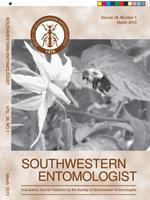Most soursop, Annona muricata L., in the world is produced in Mexico. Soursop is a tropical fruit with great commercial possibility. Currently, its commercialization in Mexico has restrictions established in national phytosanitary legislation. Some insect species such as Anastrepha that are registered as associated with soursop have not been confirmed. The purpose of this research was to extensively sample fruit in orchards and stockpile centers and use induced infestation in field cages to determine if soursop fruit hosted Anastrepha. Observation was June 2009 through June 2012 in Nayarit, Mexico. A total of 5.23 tons of fruit was sampled (n = 6,712) in commercial orchards and 7.18 tons (n = 8,418) in stockpile centers, a sum total of 12.41 tons of fruit. No soursop fruits with Anastrepha ludens or A. obliqua fly larvae were found. In fields and stockpile centers, we observed fruit infested by Optatus palmaris (Coleptera: Curculionidae) at a density of 0.12 and 0.03 larva per fruit, respectively. We collected fruits infested by Neosilba sp. larvae (Diptera: Lonchaeidae) at 0.0058 larva per fruit, from which 21 adults emerged. From 318 cedar tree fruit (Spondias sp.) collected in the study region, 35 A. obliqua adults emerged, and eight A. ludens and 57 A. obliqua were found in McPhail traps baited with hydrolyzed protein in mango orchards (Mangifera indica) where the research occurred. In McPhail traps in soursop orchards, one A. ludens, four A. obliqua, and three Anastrepha spp. were captured. In the cages, no soursop fruit was infested by A. ludens or A. oblique. From mango fruits used as hosts, five A. obliqua and two A. ludens emerged. Based on the results, we concluded that soursop was not a host for Anastrepha fruit fly. The current phytosanitary measures established in the Mexican Official Norms must be modified to deregulate soursop fruit and allow its free mobilization within the Mexican states with different phytosanitary categories in relation to fruit flies.
How to translate text using browser tools
1 March 2013
No-Host Status of Fruit Flies Anastrepha ludens and A. obliqua (Diptera: Tephritidae) in Soursop Fruit, Annona muricata (Magnoliales: Annonaceae)
Luis Martín Hernández Fuentes,
Mario Alfonso Urías López,
Álvaro Castañeda Vildózola,
Vicente Hernández Ortiz,
Mario Orozco Santos
ACCESS THE FULL ARTICLE

Southwestern Entomologist
Vol. 38 • No. 1
March 2013
Vol. 38 • No. 1
March 2013




